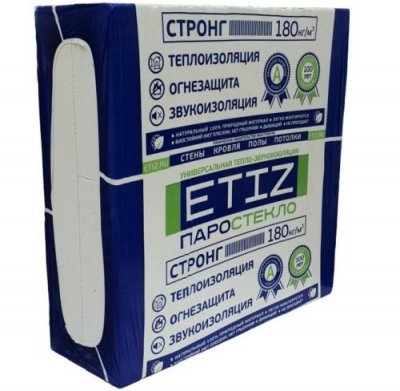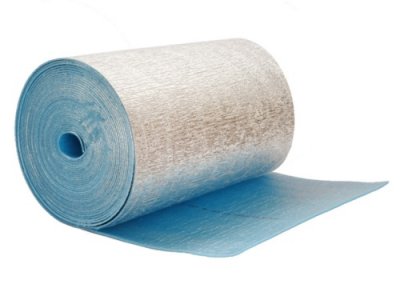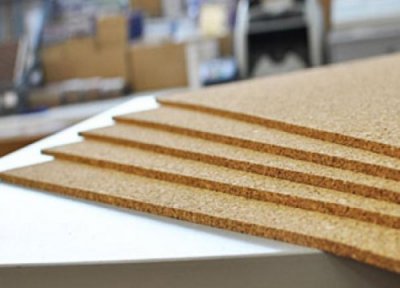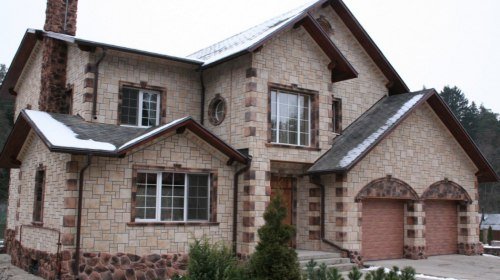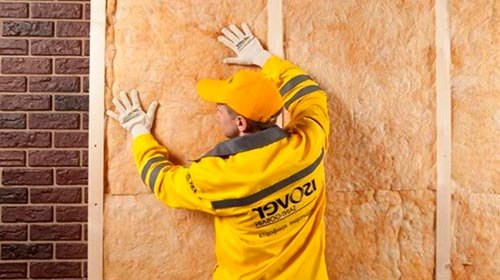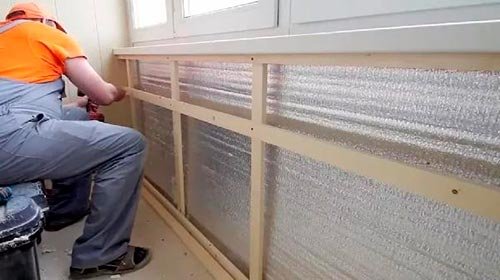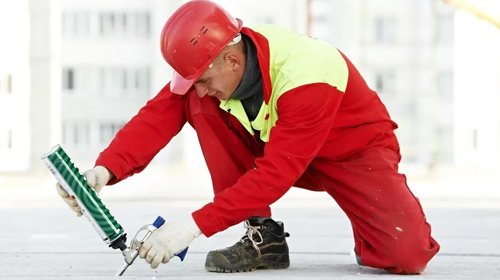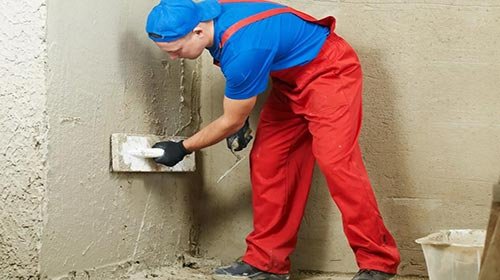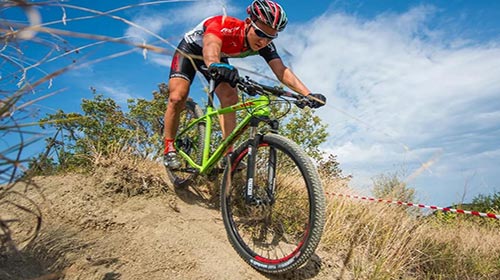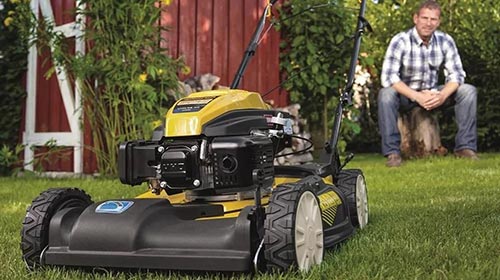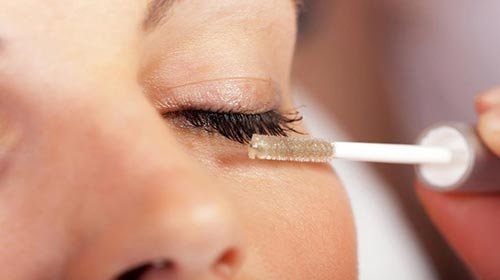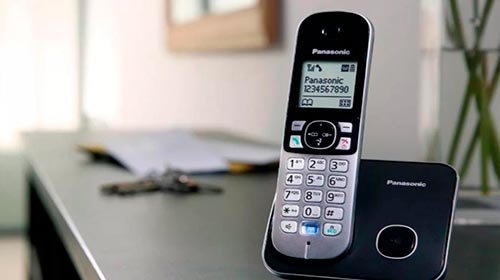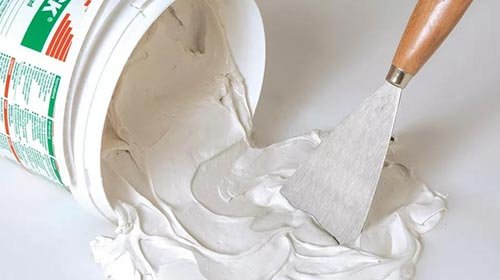A place |
Name |
Feature Rating |
| 1 | Wetisol SprayFoam-50 polyurethane foam (PPU) | The most effective outdoor insulation |
| 2 | Extruded polystyrene foam (XPS) PENOPLEX Comfort | Durable insulation with high strength |
| 3 | EcoVata SoundGuard EcoAcoustic | The most environmentally friendly insulation |
| 4 | Polyfoam PSB-S 15 | Best price |
| 5 | Thermal insulation ETIS Paroglass Strong 180 | Heat insulation of a new generation |
| 1 | Wicanders technical plug | Universal natural insulation |
| 2 | Fiber plates GB-600 | Innovative heat insulator |
| 3 | ISOVER mineral wool Optimal | Convenient installation, high popularity |
| 4 | Liquid insulation Altermo Standard | The thinnest thermal insulation layer |
| 5 | Penofol 2000 | Combined insulation |
Warming the house can significantly reduce the cost of heating the living space. Along with the installation of energy-saving windows and doors, integrated insulation of the roof and foundation, it is important to reliably protect from the cold and the wall. There are many different types of heaters on the construction market, but not all of them can claim to be the best material. Some of them can be used outside the house for siding, others can be optimally used inside the house. It all depends on the type of wall and features of the insulator. To choose the most effective insulation, and not to go broke, it is useful to get acquainted with the recommendations of experts.
- First of all, it is necessary to take into account the thermal conductivity of the material. It should correspond to the climate of the region. The effectiveness of insulation should be combined with its thickness. Preference should be given to thinner materials with the same thermal conductivity.
- More profitable look universal heaters that simultaneously protect the house from cold, noise, moisture, etc. This will significantly save on work.
- The choice of insulation also depends on the type of wall. It is easier to glue a heat insulator to brick foundations, and it is more convenient to fix it to nails or screws on wooden walls.
- The best result gives a comprehensive wall insulation. Outside, weather-resistant material is selected, inside it is necessary to use eco-friendly insulation.
- Do not forget about such a moment as biological resistance to mold and fungus. In any case, the insulation has a certain moisture content, which becomes the soil for microorganisms. But not all of them breed bacteria.
- A useful property of a heat insulator will be resistance to ignition. It is from the insulation that the fire starts when the wiring is closed.
In our review got the best insulation for the walls. The following criteria were taken into account when compiling the rating:
- innovative material;
- ecology insulation;
- specifications;
- price;
- expert opinion;
- consumer reviews.
The best insulation for walls outside
External heaters are selected based on their resistance to weathering. It is also better to give preference to materials that do not attract insects (wasps, hornets) and rodents (mice, rats).
5 Thermal insulation ETIS Paroglass Strong 180
 Heat insulation of a new generation
Heat insulation of a new generation
A country: Russia
Average price: 1130 rub. (0.24 sq. M.)
Rating (2019): 4.6
According to many technical characteristics, thermal insulation of Strong glass Strong 180 of the Russian company ETIZ exceeds traditional insulation. Solid porous material is made of liquid glass by foaming and subsequent curing. The heat insulator is developed and patented by Russian scientists. Experts compare foamglass insulation with eggshell. It creates the perfect protection from cold and noise for the inhabitants of the house. The unique properties of the material are explained by the cellular structure, so the foam glass can be mounted on glue and then plastered. Thermal insulation density of 180 kg / cu.m is ideal for finishing frame, brick walls outside due to fire resistance, chemical and biological resistance, high vapor permeability and durability.
Not all users can afford the use of Strong Strong Glass 180 because of the high cost. Also, the material is afraid of shock loads.
4 Polyfoam PSB-S 15
 Best price
Best price
A country: Russia
Average price: 44 rub. (12 sq. M.)
Rating (2019): 4.6
One of the most popular heaters in construction remains foam. Polystyrene foam brand PSB-S 15 has the lowest price, which is the reason for the popularity of the material. When using this heat insulator it is necessary to consider its features. Polyfoam PSB-S-15 has a white color and consists of foamed alloyed granules. Of all the brands this heater has the lowest density. Therefore, the material does not withstand mechanical impact, which affects the scope. With the help of foam plastic, walls in a frame house or under siding are insulated, it can be fixed to brick or block foundations.
The advantages of polystyrene users say biological safety, resistance to moisture and microorganisms, durability. Of the obvious disadvantages can be distinguished fragility of insulation, flammability. In addition, rodents often make nests in it.
3 EcoVata SoundGuard EcoAcoustic
 The most environmentally friendly insulation
The most environmentally friendly insulation
A country: Russia
Average price: 840 rub. (2.4 kg or 2.4 sq. M.)
Rating (2019): 4.7
One of the most environmentally friendly insulation for walls is ecowool. However, the material is most often used as an outer insulator. The fact is that the heat insulator is able to absorb a large amount of moisture, but it evaporates badly. Therefore, experts recommend to apply a heat-insulating coating outside the building. Ecowool is produced as a loose homogeneous mass, which is applied by spraying, or as SoundGuard EcoAcoustic slabs. Insulation has excellent sound insulation abilities, which makes its use cost-effective.
The experience shared by users in the thematic forums demonstrates the high efficiency of this heat and noise insulator. It does not start rodents and insects. Not suitable material for residents of the house who are allergic to paper dust.
2 Extruded polystyrene foam (XPS) PENOPLEX Comfort
 Durable insulation with high strength
Durable insulation with high strength
A country: Russia
Average price: 300 rub. (2.8 sq. M.)
Rating (2019): 4.8
The technology of extruded polystyrene production was invented by the Americans in 1941. Since 1998, the Russian company Penoplex has supplied a moisture-proof insulation to the domestic market. Extruded polystyrene (XPS) is a foamed granules of organic compounds that are formed after squeezing through dies. Excellent insulating qualities are formed due to a large number of small closed cells. Other useful properties for homeowners, such as sound insulation and moisture resistance, are also inherent in the material. Unlike polyfoam extruded polystyrene foam has a high compressive strength, which expands its scope.
Users call it the best insulation for the walls of the house outside. It is suitable for both brick and wooden bases. The disadvantages of the material include flammability, high price and "friendship" with insects.
1 Wetisol SprayFoam-50 polyurethane foam (PPU)
 The most effective outdoor insulation
The most effective outdoor insulation
A country: Russia
Average price: 2 190 rub. (0.86 kg)
Rating (2019): 4.9
Universal insulation material is polyurethane foam (PUF). With it, you can insulate the walls outside the frame, brick or wooden house. The material is becoming increasingly popular on the Russian market due to its excellent heat, sound and waterproofing properties. Experts consider it the best outdoor broadband insulator. Liquid insulation Wetisol SprayFoam-50 has excellent adhesion with any surfaces, low thermal conductivity, high penetrating power.Creating a continuous layer, it is possible to neutralize the cold bridges that form in the frame or crate.
Users who used the Wetisol SprayFoam-50 insulation note high insulation performance, resistance to decay and damage by insects or rodents. The disadvantage of the material is the high price, the need to use special equipment for the application.
The best insulation for walls inside
When selecting an internal insulation material environmental friendliness comes to the fore. Constant contact with the heat insulator may adversely affect the health of people sensitive to allergens.
5 Penofol 2000
 Combined insulation
Combined insulation
A country: Russia
Average price: 990 rub. (9 sq. M.)
Rating (2019): 4.6
The best insulating qualities are demonstrated by Penofol 2000 material. It is a combined protection against cold and noise. In addition, insulation is characterized by high vapor barrier properties. The basis of penofol is foamed polyethylene, in which the air pores are closed. On the one hand (in some versions on both sides) aluminum foil is attached to the polyethylene foam. Its thickness is only 14 microns, so the metal part does not make the heat insulator much heavier. Penofol can be used both as the main insulation layer and for additional insulation inside the premises.
Users most often used penofol for warming old wooden houses. Flattering words deserve ease of installation, reasonable price, fire resistance. The disadvantage of the material is insufficient thermal conductivity for use in regions with cold climates.
4 Liquid insulation Altermo Standard
 The thinnest thermal insulation layer
The thinnest thermal insulation layer
A country: Russia
Average price: 3 200 rub. (10 l)
Rating (2019): 4.6
An interesting novelty in the field of thermal insulation materials was the liquid thermal insulation Altermo Standard. This product is sold as a white emulsion, which is applied with a roller, brush or spray. The manufacturer has applied a unique technology that allowed to obtain acrylic-bound evacuated microspheres. The composition also contains anti-corrosion and antifungal additives. Externally, the two-layer coating is a regular paint. Only the heat-insulating layer has a high elasticity and excellent vapor permeability. The test results showed that the application of 1 mm of liquid insulation is equivalent to using a layer of 50 mm mineral wool. At observance of technology service life makes 20 years.
Most often, users used liquid insulation for wall insulation on loggias and balconies. Even a tactilely treated surface is warmer than a regular brick surface.
3 ISOVER mineral wool Optimal
 Convenient installation, high popularity
Convenient installation, high popularity
A country: Russia
Average price: 378 rub. (2.4 sq. M.)
Rating (2019): 4.8
Mineral wool is an inorganic insulation with a fibrous structure. The material is found in the domestic market in different versions. Different mineral and composition. Stone (basalt) wool is best suited for laying insulation inside buildings. The leading position is occupied by the company ISOVER, which offers the consumer a variety of insulation options. For walls optimally looks mineral wool in the form of plates or rolls. The choice depends on the wall casing, type of foundation, etc. The popularity of mineral wool is explained by an affordable price, good heat and sound insulation qualities, ease of installation.
Along with low thermal conductivity and excellent elasticity, users noticed some disadvantages of this insulation. This deterioration of thermal conductivity when wet and high levels of dust. Causes controversy and environmental friendliness of the material due to the presence of formaldehyde resins.
2 Fiber plates GB-600
 Innovative heat insulator
Innovative heat insulator
A country: Russia
Average price: 339 rub. (1 sq. M)
Rating (2019): 4.8
The best qualities of stone and wood combine innovative fibrolite slabs. They are absolutely safe for human health, which allows them to be used as an internal insulation. The GB-600 plate is available in thicknesses from 14 to 50 mm, so you can pick up the material for any climatic conditions. The composition of the heat insulator includes components such as wood wool, water glass and portland cement. The scope of application is not limited to wall structures, fibrolite has also proven itself as a heater for floors, foundation and roofing.
Many users use fibrolitovy plates as constructional material, for example, in the form of a fixed timbering. The weak point of insulation is considered to be low water resistance, which, in combination with temperature changes, leads to destruction.
1 Wicanders technical plug
 Universal natural insulation
Universal natural insulation
A country: Portugal
Average price: 700 rub. (0.558 sq. M.)
Rating (2019): 4.9
To the best interior insulation for walls can be attributed technical stopper Wicanders. Natural material is made of cork oak, it is designed for thermal insulation inside the premises. Depending on the destination, a roll or plate with a certain thickness is selected. For walls, experts recommend cork insulation in the form of plates with a thickness of 4 to 10 mm. The uniqueness of the material lies in its universal qualities. It is not only a good heat insulator, but also effectively reduces noise, does not allow moisture to penetrate, is not afraid of temperature changes, does not burn.
Cork does not cause allergies, which is especially important for a certain category of people. Insulation does not attract rodents and insects, does not rot, microorganisms do not develop on it. One of the main drawbacks of the technical traffic jam, according to users, is the high price.
